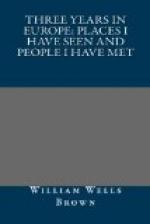* * * * *
I am now in Sheffield, and have just returned from a visit to James Montgomery, the poet. In company with James Wall, Esq., I proceeded to The Mount, the residence of Mr. Montgomery; and our names being sent in, we were soon in the presence of the “Christian Poet.” He held in his left hand the Eclectic Review for the month, and with the right gave me a hearty shake, and bade me “Welcome to old England.” He was anything but like the portraits I had seen of him, and the man I had in my mind’s eye. I had just been reading his “Pelican Island,” and I eyed the poet with no little interest. He is under the middle size, his forehead high and well formed, the top of which was a little bald; his hair of a yellowish colour, his eyes rather small and deep set, the nose long and slightly aquiline, his mouth rather small, and not at all pretty. He was dressed in black, and a large white cravat entirely hid his neck and chin: his having been afflicted from childhood with salt-rhum, was doubtless the cause of his chin being so completely buried in the neckcloth. Upon the whole, he looked more like one of our American Methodist parsons, than any one I have seen in this country. He entered freely into conversation with us. He said he should be glad to attend my lecture that evening, but that he had long since quit going out at night. He mentioned having heard William Lloyd Garrison some years before, and with whom he was well pleased. He said it had long been a puzzle to him, how Americans could hold slaves and still retain their membership in the churches. When we rose to leave, the old man took my hand between his two, and with tears in his eyes said, “Go on your Christian mission, and may the Lord protect and prosper you. Your enslaved countrymen have my sympathy, and shall have my prayers.” Thus ended our visit to the Bard of Sheffield. Long after I had quitted the presence of the poet, the following lines of his were ringing in my ears:—
“Wanderer, whither dost thou
roam?
Weary wanderer, old and grey,
Wherefore has thou left thine
home,
In the sunset of thy day.
Welcome wanderer as thou art,
All my blessings to partake;
Yet thrice welcome to my heart,
For thine injured people’s




